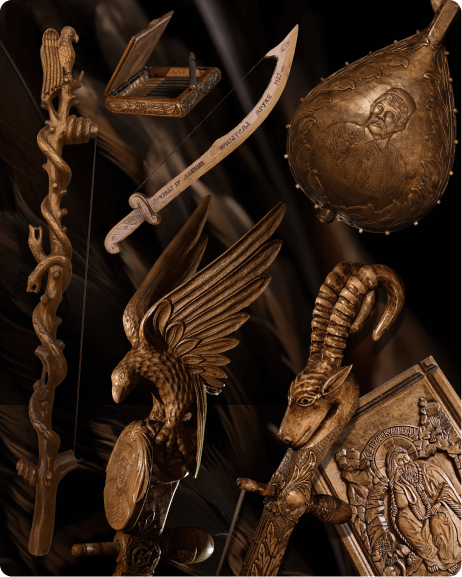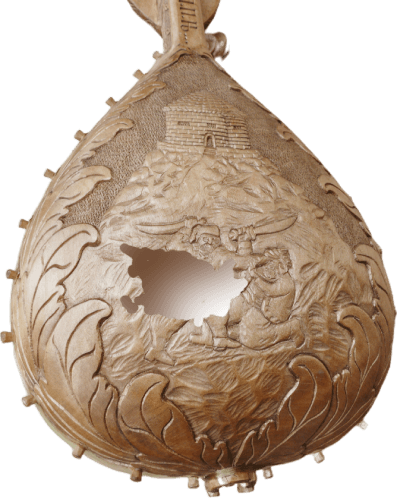


Gusle are folk musical instruments from the Balkan region. They typically have one, occasionally two strings. They are mostly made from maple wood, which is considered the best for this purpose. As a single-string instrument, gusle are found in Serbia, Montenegro, Bosnia and Herzegovina, and Dalmatia (Croatia).
The strings on the gusle are made from twisted horsehair, similar to the strings of a bow. The bow is used to draw across the gusle strings, producing a sharp and dramatic sound. Playing the gusle requires significant skill.
The instrument itself consists of a resonating box (kalica) covered with animal skin, typically goat's. A long neck continues onto the box. At the end of the neck is the head of a gusle, adorned with a carved animal head, typically a horse or a bird, such as an eagle or falcon.
During the performance, the instrument's body is laid on the knees (in the lap), while the long neck is supported by the palm of one hand.
Gusle have played an important role in the history of epic poetry, as guslars - folk singers, have sung about historical events for centuries, until those texts were finally recorded.
Parts of Gusle:
Kalica - hollowed-out wood with stretched animal skin, with a perforation in the middle to enhance the instrument's sound.
The Holder - consists of the neck and the head.
The head - the top part of the gusle, usually richly decorated and often featuring a carved figure of a person, horse, bird, etc. The neck is held by the gusle player (guslar) while playing, and the bow is drawn across the tightened instrument's strings with the other hand.
Strune (strings) are made from horsehair.
End pin - the part at the bottom of the gusle, to which the string is attached.
Tuning peg - located between the head and handle, the string is wound around it.
The bridge (horse) - a small piece of wood that separates the string from the resonating part. It is located between the end pin and the perforation and can be up to three fingers tall.
Bow (gudalo) - the bow made from a naturally curved branch and horsehair string.
The first mention of gusle among the South Slavs comes from the Byzantines, in the first half of the 7th century.

We have available gusle in our stock.
We created a few minute guide with advices based on budget and time. 😊

We replace strings, skin on kalica, lacquering, repair broken pieces and create once that are missing and etc.
See "before->after" images and sound of gusle after repair process is done 😊